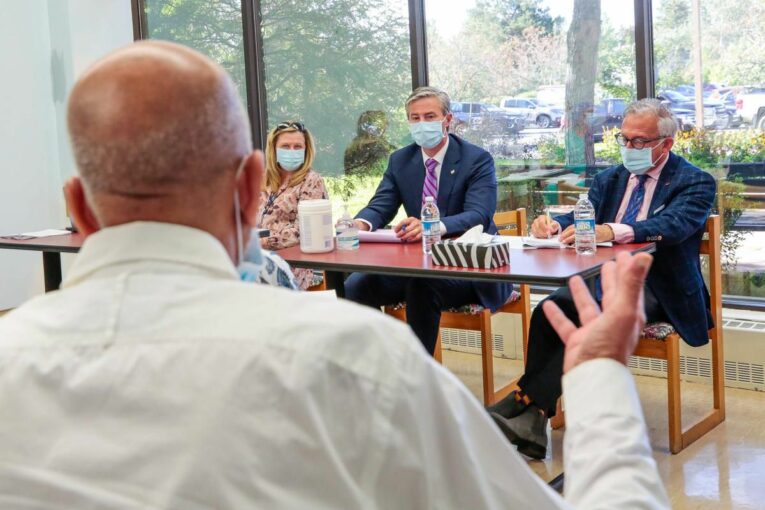
[ad_1]
In the midst of what some have described as a national bidding war for health-care professionals, it may be that the first truly new innovation is coming out of Nova Scotia.
In the wake of his August 2021 election win, Premier Tim Houston, who campaigned heavily on health-care issues, immediately created a discrete office — the first of its kind in the country — dedicated to giving the province a leg up when it comes to attracting doctors and nurses.
In his province, some 80,000 people — about eight per cent of Nova Scotians — are still on a waiting list to be paired with a family doctor.
According to government figures, there are 97 vacancies for family doctor positions as of September 2021, to go along with 75 vacancies for specialty doctor positions.
And there are an estimated 1,100 vacancies for registered nurses in the province, alongside another 250 vacancies for licensed practical nurses and 25 for nurse practitioners.
Most other provinces face similar shortages.
In a pre-COVID-19 national health survey, Statistics Canada estimated that 14.5 per cent of Canadians did not have a regular health-care provider. The pandemic, according to most, has only served to exacerbate that problem.
The upshot is that many provinces have created incentive packages, including hefty cash bonuses, to lure health-care professionals.
“Clearly many, many provinces have shortages of nurses (and doctors) and there is a competition to hire them and to bring them to the province and have them work in our systems,” said Dr. Kevin Orrell, the man who’s been tasked with remedying the Nova Scotia shortfall.
He’s the CEO of the province’s newly minted Office of Healthcare Professionals Recruitment. His job is not only to increase the number of health-care professionals working in the province, but also to retain those already working there.
“(Premier Houston has) placed a very high priority on the recruitment of human health resources to the province and has given this office, the Office of Health Care Professionals Recruitment, the task of looking for people to come to our province and to work in our system across all of the sectors.”
What that does, said Orrell, is to focus the attention through one office, both for doctors and nurses looking to find work in Nova Scotia, and for the government to recruit the same.
“We’re trying to be the point of contact so that we can recognize all of the interest in the province that is taking place, and then we can direct it out to the appropriate places where need exists,” he said.
That process began with a 2,200-kilometre post-election tour with Houston, speaking to health-care stakeholders to find out what and where those needs were.
To date, Orrell’s successes have been limited but significant.
In late October, the province announced a program to guarantee every new nursing school graduate a job. And in the next year, the province will have hired four new specialists in Cape Breton.
As well, said Orrell, there are expressions of interest from a number of family care physicians and specialists to come work in other parts of the province.
But as much as the actual recruitment is significant, said Heather Johnson, president of Doctors Nova Scotia, so too is the message that establishing Orrell’s office sends to the province’s patients.
“That is a big job, and it’s not a job that somebody should do off the side of their desk while they’re doing other things,” she said. “The establishment of the office actually sends a message to people that it is a priority.
“People have realized that it’s a competitive job market, and if we’re going to compete, we need people who are only doing that.”
Part of the task ahead, said Johnson, is understanding which communities have — or will have — a need, and connecting doctors with those communities.
But another part is that not only does the province have to find the people who can do the job and recruit them, but it also has to make it easy for those people to make the move, integrate with their new communities and begin making a living.
“One of the things you don’t want to be is the province where, (people say): ‘We’d like to go there, but it’s so difficult and you have so many barriers for me to come practise. I think I’ll just stay in Province X.”
In addition to sending a message to Nova Scotian patients, one of the added bonuses of having a dedicated recruitment office is accountability, said Janet Hazelton, chair of the Nova Scotia Nurses Union.
“I think it’s early days yet, but I suspect the reason why the premier has (created a separate recruitment office) is because he’s he’ll be looking for results,” said Hazelton.
“If that’s their only job, it’s pretty easy to measure, right?”
But from a nursing standpoint, if Orrell’s office wants the win, it will have to be looking at new ideas for the retention of existing nurses as much as it looks at recruitment, she said.
Although, Nova Scotia has guaranteed a job for every nursing school graduate, there are only 470 new registered nurses graduating in the province each year. Even ignoring pending retirements and nurses leaving the profession, it would still take the better part of two-and-a-half years to fill existing vacancies.
In her meetings with Orrell, Hazelton said she stressed that he’ll have to pay attention to mid- and late-career nurses who were considering retirement, downgrading to part-time hours or leaving the profession altogether.
The primary reason for those choices is the workload, she said. One of the ways to keep those nurses on the job is by changing the ways that they work.
“Let’s ask the nurses that are within a year of retirement. ‘So, you want to retire? Tell me why?’” said Hazelton. “And it could be: I can’t take the shift work. Well, instead of losing them altogether, let’s talk about, can we do something like hire them to mentor our new grads?”
“Right now, we’re losing them completely as opposed to tailoring to what their needs are.”
At this point, it’s difficult to measure future success in terms of target numbers, said Orrell. An improvement in one area of health care, he says, changes the equation elsewhere, making target numbers difficult to pin down.
Rather, he prefers to focus on a timeline for improved ease of access to health care for Nova Scotians.
“An access and flow improvement would be a measure. And of course, that would be associated with a reduction in the number of orphan patients that are on this wait list for a family doctor,” he said.
“We’re in the process of putting together a workforce resource plan and basically we would be evaluating the need throughout the province in different communities and different zones. And I think after we knew that, then we’d be able to put some estimates on how soon this could be done.”
While he’s been getting informal questions on his department, said Orrell, he has yet to be formally approached by any provincial government thinking of emulating the Nova Scotia model.
[ad_2]
You can read more of the news on source



